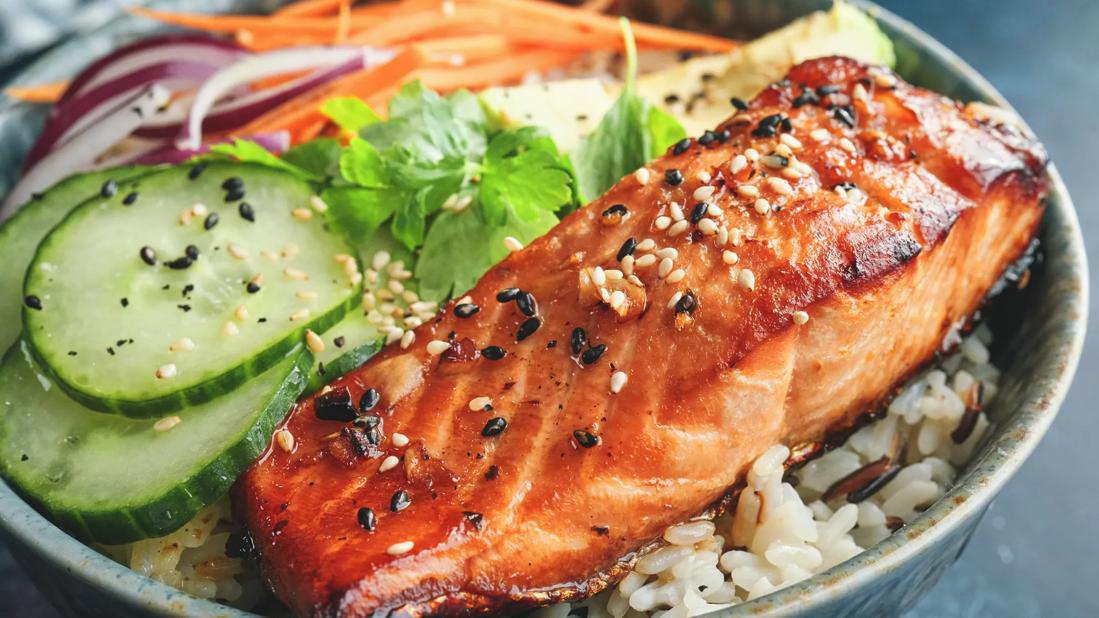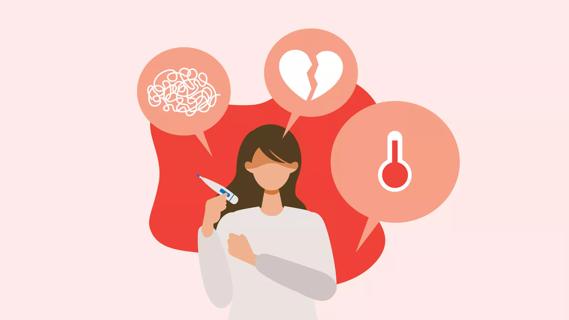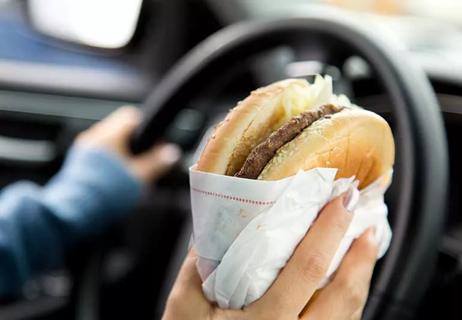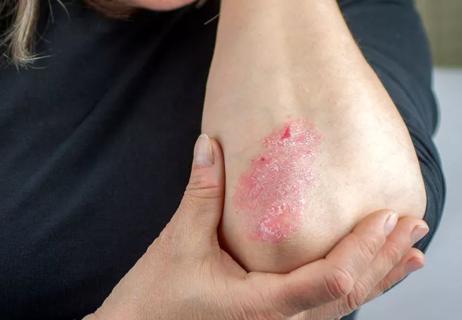Give these 30+ grocery items a try to help find relief

Anxiety isn’t exactly in short supply these days. It’s estimated that more than 300 million people around the world experience the fear, worry and restlessness that may come with the condition.
Advertisement
Cleveland Clinic is a non-profit academic medical center. Advertising on our site helps support our mission. We do not endorse non-Cleveland Clinic products or services. Policy
Now, there’s no one single way to tame or manage anxiety, but an opportunity to reduce its symptoms arrives at every meal. That’s because the food you eat can help dial down (or crank up) internal stress levels.
So, what might you want to consider putting on your plate as you adopt more mindful eating habits? Let’s set a menu with functional medicine specialist Melissa Young, MD, and registered dietitian Julia Zumpano, RD, LD.
There’s an old saying that “Food is medicine.” (And when we say old, we mean it: The origins of the quote date back to ancient Greece and Hippocrates, who is often referred to as the Father of Medicine.)
The wise words of Hippocrates reflect what modern research has shown, especially when it comes to mental health.
“We’re understanding more and more just how much food influences the body,” says Dr. Young. “There’s clear medical evidence that nutrition affects our emotional well-being and can reduce the risk of anxiety.”
Many foods that may offer anxiety relief share certain characteristics, including being high in:
Here are 30+ foods that check some of those boxes.
If you’re fishing for an ideal food to address anxiety, wild salmon is a great catch.
Advertisement
Salmon is a solid source of omega-3s, healthy fats loaded with nutrients that act as a calming influence on your brain. Omega-3s can also help reduce inflammation, which can be a driving force for anxiety.
The fish dish is high in protein, magnesium, vitamin B12 and vitamin D, too.
“You’re not just getting one benefit out of salmon,” notes Zumpano. “You’re getting multiple forms of nutrients that can help when it comes to anxiety. You’re really maximizing one food item.”
In general, fish are packed with omega-3s. Other seafood options to consider for your menu include:
Holy guacamole! Avocados are great for your brain and mental health!
For starters, the wrinkly green fruit is high in magnesium — a “super nutrient” that many of us aren’t getting enough of, shares Zumpano. Researchers say the magnesium deficiency is a common issue worldwide.
Evidence suggests that magnesium can help reduce anxiety by regulating your body’s level of cortisol, or the “stress hormone.” The mineral can also help balance out neurotransmitters in the brain that excite or inhibit nerves.
“Upping the magnesium intake in your diet can certainly make a difference,” she notes.
As an added bonus, avocados offer fiber and omega-3 fatty acids to combat anxiety, too.
Red meat raises some red flags when it comes to your health. Eating too much of it can increase your risk of heart disease, cancer and diabetes. (It’s safe to say a hamburger a day WILL NOT keep the doctor away.)
But beef is also loaded with protein and vitamin B12, both of which can help minimize anxiety symptoms. (Protein helps balance cortisol and blood sugar; vitamin B12 can bring an energy boost to ward off stress.)
So how do you balance the bad with the good with beef? For starters, focus on serving size. A serving of beef should be about 3 ounces, which is roughly the size of a deck of cards. (Most of us eat far more than that a sitting.)
Moderation is important, so try to limit your consumption of beef to no more than one to two times per week. It’s also best to look for grass-fed beef, which typically is more nutrient-dense.
Chicken also delivers hefty amounts of protein and vitamin B if you’re looking to make a meat-based meal, says Zumpano. And fresh cuts of meat are always best. Try to avoid overly processed meats (like hot dogs, sausages and lunch meats).
Another important fact to consider: Varying your protein sources — including eating meatless protein options, a few of which we’ll address — allows you to maximize the nutrients you consume.
Advertisement
The reason eggs may be good for anxiety will sound familiar: They’re high in protein and vitamins B12 and B7, similar to the abovementioned meats.
Zumpano notes that eggs have “gotten a bad rap over the years” given their reputation as a high-cholesterol food. But she affirms: “Eggs are a phenomenal source of nutrition.” Just eat the yolks in moderation. (For most people, that’s about one yolk per day.)
Yogurt and nondairy yogurt alternatives are chock full of beneficial bacteria called probiotics that can improve the health of your gut and ratchet down anxiety. “That’s why keeping your gut happy can help calm your whole system,” says Dr. Young.
Your brain and gut share a surprising connection. Fun fact: More information passes between those two systems than any other systems in your body. Consider them besties when it comes to sharing info.
So, if your gut microbiome isn’t right, it can increase your risk of anxiety, she adds.
Many yogurt varieties (such as Greek yogurt) are also high in protein to help ease anxiety. (Another win-win!)
Plain yogurt is best, clarifies Zumpano. Try to steer clear of unnecessary additives in yogurt like added sugar, syrups, chocolate and candy toppings. If you need a little something extra, consider dropping in fresh fruit, chopped nuts or a teaspoon of pure honey or maple syrup.
Advertisement
Vegetables always seem to make any list involving foods to better your health. Here’s why they make a difference for anxiety.
Vegetables are high in fiber — and fibrous foods are prebiotics that feed the good bacteria in your gut. (Basically, prebiotics are good for your probiotics and other friendly bacteria in your innards.)
High-fiber veggies include:
What’s your favorite kind of bean? Whatever the answer — black, kidney, pinto, etc. — consider them fuel for driving away anxiety given their protein and fiber content. (They’re also fuel for flatulence, but that’s another story.)
Want more items in your grocery cart to push away anxiety and stress? Then try adding these items to your shopping list:
You may also be able to help keep anxiety down by avoiding certain foods that stress the body. The list includes:
Advertisement
You’ve just read over a lot of information. Digesting it all can be … well, a bit stressful — and that’s not the goal when you’re trying to reduce anxiety.
Zumpano suggests starting with a few small changes at meals. Try salmon or another fish for dinner one night this week, for instance. Go with yogurt or eggs for breakfast. Include a veggie with lunch (such as a side salad or carrots). Snack on nuts or fresh fruit.
“Take it one step at a time,” she encourages. “Over time, it can make a positive impact.”
Remember, too, that diet is only one way to help manage anxiety. Stress management, exercise, getting enough sleep and managing chronic diseases like diabetes, hypertension and obesity can also make a difference.
And if you ever feel overwhelmed, talk to your healthcare provider about options.

Sign up for our Health Essentials emails for expert guidance on nutrition, fitness, sleep, skin care and more.
Learn more about our editorial process.
Advertisement

Even small moments of time outdoors can help reduce stress, boost mood and restore a sense of calm

Fill your coping toolbelt with healthy skills like getting outside, writing in a journal, volunteering, laughing or talking with a friend

We all experience some stress from time to time, but chronic stress can contribute to health issues like diabetes and cardiovascular disease

Getting outside, eating a healthy diet, taking up journaling, listening to music — even cuddling a pet — can provide stress relief

In response to stress or danger, your brain responds by either defending itself, running away, stopping or reconciling

From nausea, weight gain and eczema, stress can affect your immune system in many ways

Stress hormones trigger cravings in an attempt to keep us safe from danger

From stomachaches and hives to sleepless nights and missed periods, stress can make an impact

Even small moments of time outdoors can help reduce stress, boost mood and restore a sense of calm

A correct prescription helps your eyes see clearly — but as natural changes occur, you may need stronger or different eyeglasses

Both are medical emergencies, but they are very distinct events with different causes